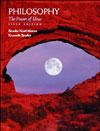 |
1 |  | 
What do we directly observe, according to David Hume? |
|  | A) | Physical objects |
|  | B) | Sense impressions |
|  | C) | Ourselves |
|  | D) | Our brains |
 |
 |
2 |  | 
What is the self, according to Hume? |
|  | A) | A sequence of perceptions. |
|  | B) | An immaterial, unchanging substance. |
|  | C) | A physical body. |
|  | D) | A social entity. |
 |
 |
3 |  | 
Why can't we have cause and effect knowledge, according to Hume? |
|  | A) | We can never observe a constant conjunction between events. |
|  | B) | We can never observe the cause and the effect at the same time. |
|  | C) | We can never observe a necessary connection between events. |
|  | D) | We can never observe the atoms that make up the cause and the effect. |
 |
 |
4 |  | 
Why can't past experience justify claims about the future, according to Hume? |
|  | A) | Our knowledge of past experience depends on memory, which cannot be known to be accurate. |
|  | B) | Trick question! Hume does think that past experience can justify claims about the future. |
|  | C) | Because we can never know if we are the same person as the person we seem to remember being, past experience cannot be a guide to claims about our future. |
|  | D) | We can never know whether or not the future will be like the past. |
 |
 |
5 |  | 
What is perception, for Immanuel Kant? |
|  | A) | Sense impressions. |
|  | B) | The organizing principles of the mind. |
|  | C) | The application of the organizing principles of the mind to sense impressions. |
|  | D) | The direct awareness of noumenal objects. |
 |
 |
6 |  | 
Why can we know that all of our future experiences will be in space and time, according to Kant? |
|  | A) | Because all of our past experiences have been. |
|  | B) | Another trick question! Kant says we can't know this. |
|  | C) | Because these are preconditions of all possible experience based on the mind's own organizing principles. |
|  | D) | Because a good God would not deceive us about such matters. |
 |
 |
7 |  | 
What does Kant mean by the noumenal world? |
|  | A) | The world as it really is, independently of our experiences of it. |
|  | B) | The world as it is presented to us in experience. |
|  | C) | The world of mind. |
|  | D) | The world of matter. |
 |
 |
8 |  | 
Why doesn't Kant think that we can have knowledge of the things-in-themselves (das ding-an-sich)? |
|  | A) | Because they have not yet been experienced. |
|  | B) | Because they are not physical in nature. |
|  | C) | Because they are not mental in nature. |
|  | D) | Because the organizing principles of the mind do not apply to them. |
 |
 |
9 |  | 
According to Absolute Idealism, what is the relationship between being real and being knowable? |
|  | A) | No reality is knowable. |
|  | B) | All reality is knowable. |
|  | C) | Some reality is knowable and some isn't. |
|  | D) | Only God is ultimately unknowable. |
 |
 |
10 |  | 
What is the highest reality (the Absolute), for Hegel? |
|  | A) | The entire material world. |
|  | B) | A God who exists beyond the world. |
|  | C) | Infinite thought thinking itself. |
|  | D) | A vast group of independent particulars. |
 |



 2002 McGraw-Hill Higher Education
2002 McGraw-Hill Higher Education